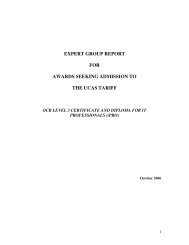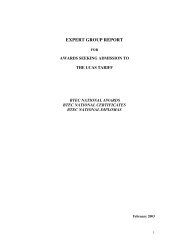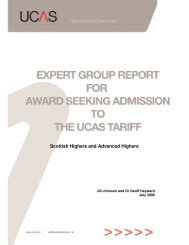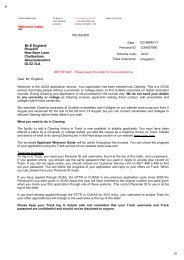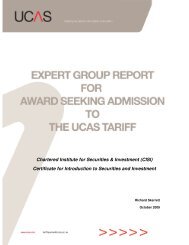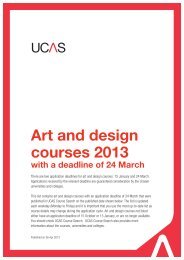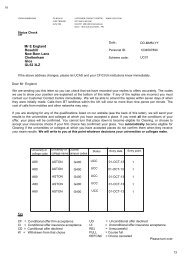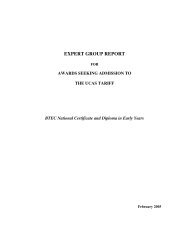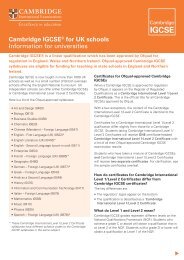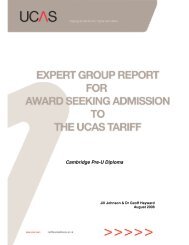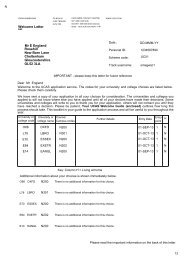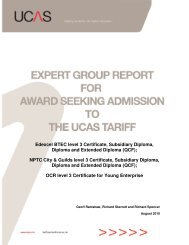International qualifications 2013 (pdf) - CUKAS
International qualifications 2013 (pdf) - CUKAS
International qualifications 2013 (pdf) - CUKAS
You also want an ePaper? Increase the reach of your titles
YUMPU automatically turns print PDFs into web optimized ePapers that Google loves.
Qualifications currently offered<br />
Turkey<br />
EVALUATION<br />
Devlet Lise Diplomasi (State High School Diploma)<br />
Lise Bitirme Diplomasi (Private High School Diploma)<br />
Considered to be at a standard of at least GCSE level. Students<br />
with an overall average of four out of five satisfy the general entry<br />
requirements of some British HEIs.<br />
Genel Lise (State High Schools)<br />
Students can enrol in state high schools directly following<br />
completion of their primary education without undertaking an<br />
entrance test. This stage of education lasts four years, and<br />
consists of a curriculum of natural sciences (physics, biology and<br />
chemistry), Turkish literature, social sciences or foreign<br />
languages. The aim is to prepare students for higher education.<br />
Most graduates will need a foundation year in the UK prior to<br />
commencing a degree programme.<br />
Anadolu Lisesi (Anatolian High School Diploma)<br />
Anatolian high schools are selective institutions, which were<br />
established with the aim of preparing students for university, and<br />
at the same time combining students of similar interests and<br />
abilities together. Depending on the resources, these schools may<br />
offer a five-year programme, which includes an initial year of<br />
intensive foreign language teaching as a preparatory year. This is<br />
usually English; it may also be French or German. Tuition is in<br />
Turkish after the preparatory year; however, depending on<br />
resources and demand, the tuition of natural sciences (physics,<br />
biology and chemistry) and mathematics can be delivered in a<br />
foreign language.<br />
The demand for places in the Anatolian high schools is very high<br />
and admission is through a competitive entrance examination.<br />
Graduates are generally successful in the university entrance<br />
exam. The graduates who have grade point averages above 4.5<br />
and whose English skills are satisfactory are mostly eligible for<br />
first-year entry into British HEIs.<br />
Science High School (Fen Lisesi)<br />
Science high schools were established with the aim of providing<br />
education to exceptionally gifted students in the areas of<br />
mathematics and natural sciences. All students are encouraged<br />
to engage in scientific research activities. These schools offer a<br />
four-year programme with a curriculum that emphasises science<br />
and mathematics. The language of instruction is Turkish. Entrance<br />
to science high schools is through an extremely competitive<br />
examination. The graduates of these schools generally achieve<br />
the highest scores in the university entrance exam for all Turkey.<br />
Private Foreign Language Medium Schools (Yabanci Dil<br />
Agırlıklı Özel Lise)<br />
A group of schools offering international curriculum and<br />
<strong>International</strong> Baccalaureate Diploma option to their students<br />
together with the national curriculum. Some of them are very<br />
reputable and the teaching quality is excellent. These schools<br />
offer five-year programmes, which includes one year of intensive<br />
language tuition. Most of their students are eligible for first-year<br />
entry to UK HEIs.<br />
Devlet Teknik Lise Diplomasi (State Technical four-year High<br />
School Diploma)<br />
Devlet Meslek Lise Diplomasi (State Vocational High School<br />
Diploma)<br />
Considered to be between BTEC First Diploma and BTEC National<br />
Diploma and of similar standard to State High School Diploma.<br />
Caution should be taken as these diplomas may be less suitable<br />
as a preparation for academic study.<br />
GRADING SYSTEM IN HIGH SCHOOLS<br />
Grade Number Point (Mark)<br />
Very good 5 85 - 100<br />
Good 4 70 - 84<br />
Average 3 55 - 69<br />
Pass 2 45 - 54<br />
Fail 1 25 - 44<br />
Unsuccessful 0 0 - 24<br />
Source: British Council Education UK Turkey 2012<br />
EDUCATION SYSTEM<br />
Education is compulsory from the age of six. Eight years of<br />
primary education allows entry to secondary education. Since<br />
2005, secondary education has lasted for four years, and covers;<br />
general (four years), vocational (four years) or technical education<br />
(five years). In the second year of secondary education, students<br />
can choose to specialise in natural sciences, literature and<br />
mathematics, the social sciences, foreign languages, art or<br />
physical education. The Lise Diplomasi (High School Diploma) is<br />
awarded locally on the basis of a wide range of assessments,<br />
including written and oral examinations, homework and extramural<br />
activities. Vocational secondary school prepares students<br />
for entry into a profession or HE. In addition to those, the private<br />
foreign language medium schools offer 4 + 1 intensive foreign<br />
language tuition, just like some of the Anatolian High Schools. It is<br />
compulsory to follow the Turkish curriculum for those students to<br />
receive the high school diploma; however, if the school is offering<br />
an international curriculum or the IB, those students may wish to<br />
get credits.<br />
The new four-year high school system produced its first<br />
graduates in 2009.<br />
ACCESS TO HIGHER EDUCATION<br />
Admission to HE is centralised and based on Lise Diplomasi and<br />
a Student Selection Examination (OSS). The single university<br />
placement test (OSS) was replaced with a two-stage examination<br />
in 2010. In March, students take the Transition to Higher<br />
Education (YGS). The students who achieve grades between 140<br />
and 179.99 will only be able to apply for open learning degrees<br />
(associate and undergraduate) and full-time associate degrees<br />
(2-year vocational programmes within universities). Students who<br />
achieve 180 and above are eligible to sit the second stage<br />
examination in June, the Undergraduate Placement Test (LYS).<br />
The test will be used to assign students to full-time<br />
undergraduate programmes in five sessions over two weekends.<br />
Subjects taken are mathematics and geometry, a foreign<br />
language, social sciences, Turkish literature and geography, and<br />
natural sciences. The results are announced in late July or early<br />
August.<br />
The two-year programmes lead to the award of Onlisans<br />
Derecesi/Diploma (pre-licentiate or Associate Degree); the fouryear<br />
programmes to the award of a Lisans Diplomasi. Entry is<br />
highly competitive. There is particular pressure for places in<br />
engineering, medicine, economics and business-related courses.<br />
Uganda<br />
EVALUATION<br />
Uganda Certificate of Education (UCE)<br />
Acceptable at grades 1–6 in lieu of GCSE on a subject for subject<br />
basis.<br />
INTERNATIONAL QUALIFICATIONS 61



